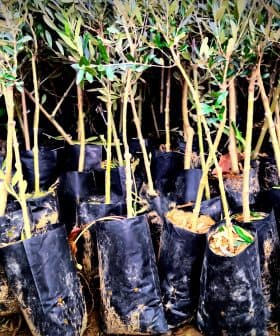Trade Group Announces Olive Oil Quality Testing Initiative

The North American Olive Oil Association (NAOOA) plans to conduct comprehensive olive oil testing across the U.S. due to high prices and decreasing global production. The testing, set to begin in January, aims to deter mislabeling and adulteration, with results expected to support the establishment of a uniform standard of identity for olive oil in the U.S.
The North American Olive Oil Association (NAOOA) said it will begin testing olive oils around the U.S. in its “most comprehensive, rigorous olive oil testing study to date.”
The trade group’s announcement came against the backdrop of historically high olive oil prices caused by a second consecutive global production decrease projected for the current crop year, coupled with meager stocks.
We want people to know that we’re going to be watching, and we will take appropriate action if we find somebody not playing fairly.
“This was an idea first brought up at the association’s summer meeting in June,” Joseph R. Profaci, the NAOOA’s executive director, told Olive Oil Times. “One of our members was very concerned that the tightening supply and rising prices created conditions ripe for people who might be motivated to try and cheat.”
“We felt both for the benefit of the industry and for consumers that this needs to be done,” he added. “The new oil will be coming into the United States at the beginning of the year, and that is when we feel… there is the biggest risk that someone might try to get away with seed oil adulteration.”
See Also:New Testing Method Simplifies Elemental Analysis of extra virgin olive oil SamplesProfaci pointed out that routine testing by the NAOOA, whose members supply more than half of all olive oil sold in the U.S., had not indicated any rise in intentionally mislabeled or adulterated olive oil in 2023.
According to data from the International Olive Council, the U.S. was expected to consume 381,000 tons of olive oil in the 2022/23 crop year, which runs from October to September. Only Spain and Italy consume more.
Profaci hopes the announcement will deter intentional mislabeling and adulteration. “We want people to know that we’re going to be watching, and we will take appropriate action if we find somebody not playing fairly,” he said.
Profaci said the association informs retailers when olive oil is found to be mislabeled or fraudulent and works with them to find the root of the problem, which can be as simple as extra virgin olive oil being shipped in poor conditions and deteriorating to virgin or non-virgin quality before arriving on the supermarket shelf.
“In situations where there is no recourse other than legal action, we will take it [through civil lawsuits] and also report to the state and federal authorities,” he said.
The NAOOA plans to begin testing at least 200 samples from a cross-section of the country in January, including from both on-trade (restaurants and food service) and off-trade (retailers and wholesalers) locations.
The testing program, funded by the trade group’s members, will test all categories of olive oil under branded and private labels, the NAOOA said.
Tassos Kyriakides, an assistant professor at the Yale School of Public Health, has been retained by the NAOOA to design the strategy of the study to ensure the sampling is representative of the overall market.
“It’s imperative for us to be involved in a project that tries to ensure the consumer that what they’re buying, what they’re spending a lot more money on, is what it is advertised to be,” Kyriakides told Olive Oil Times.
He said the sampling would be done blindly. The olive oil sample will be purchased directly from trade locations, removed from its branded packaging and assigned a number.
Next, the samples will be sent to an independent laboratory accredited by the IOC for organoleptic and physical-chemical testing. Finally, the numbered results will be returned to Kyriakides and paired with each sample.
While he applauded the initiative of the NAOOA to step up its testing efforts, Kyriakides hopes federal and state authorities take more initiative to police the sector in the future.
“From a scientific perspective, this [testing for quality and adulteration] should be happening regularly and not whenever there’s some extrinsic effect,” he said. “Repeated assessments can only help improve things and assure the consumer that what they are buying is tested over time.”
Profaci added that he would encourage other stakeholders to participate in the study, including California olive oil producers and importers who are not NOAAO members.
Along with the immediate goal of cracking down on intentional mislabeling and adulteration, Profaci said the study results will be valuable for other reasons.
“We’ll gather information about overall quality on the market that we haven’t seen before,” he said. “Then, as a corollary, the data that we’ll collect could be helpful to us in supporting the need for the standard of identity application that we filed.”
The NAOOA filed a citizen petition with the U.S. Food and Drug Administration to create a standard of identity for olive oil with the American Olive Oil Producer Association and Deoleo in 2020. The process to establish one is ongoing.
Profaci said the standard of identity would create a uniform standard for olive oil across the U.S. and help Americans better understand olive oil grades and quality while prohibiting meaningless prefixes such as ‘pure,’ ‘extra light’ and ‘premium.’
For now, however, Profaci, Kyriakides and the NAOOA say they are focused on protecting consumers during a period of high prices and market uncertainty.
“We are gathering information to help us regulate the market and protect consumers,” Profaci concluded.









